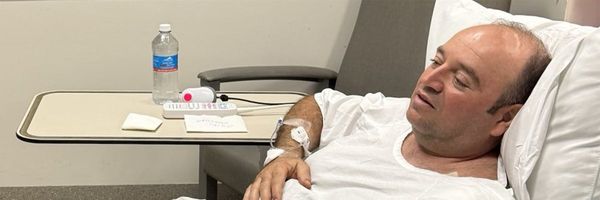
Cross-border treatment for cancer patients from north-west Syria resumed this week after February’s earthquake had left people without access to radiotherapy.
But medical organisations in the area are warning that the backlog means many cancer patients remain in limbo and some could die as a result.
Sanjana Quazi, the head of the UN humanitarian affairs agency (Ocha) in Turkey, said cross-border referrals into Turkish hospitals officially resumed this week via Bab al-Hawa, the border crossing 50km west of Aleppo.
“As of yesterday, the number of referrals has reached 80, comprising new and old cases,” Quazi said. “We are grateful to the government of Turkey and are very much encouraged by the resumption of cross-border referrals … because this will undoubtedly save lives.”
The human toll of non-communicable diseases (NCDs) is huge and rising. These illnesses end the lives of approximately 41 million of the 56 million people who die every year – and three quarters of them are in the developing world.
NCDs are simply that; unlike, say, a virus, you can’t catch them. Instead, they are caused by a combination of genetic, physiological, environmental and behavioural factors. The main types are cancers, chronic respiratory illnesses, diabetes and cardiovascular disease – heart attacks and stroke. Approximately 80% are preventable, and all are on the rise, spreading inexorably around the world as ageing populations and lifestyles pushed by economic growth and urbanisation make being unhealthy a global phenomenon.
NCDs, once seen as illnesses of the wealthy, now have a grip on the poor. Disease, disability and death are perfectly designed to create and widen inequality – and being poor makes it less likely you will be diagnosed accurately or treated.
Investment in tackling these common and chronic conditions that kill 71% of us is incredibly low, while the cost to families, economies and communities is staggeringly high.
In low-income countries NCDs – typically slow and debilitating illnesses – are seeing a fraction of the money needed being invested or donated. Attention remains focused on the threats from communicable diseases, yet cancer death rates have long sped past the death toll from malaria, TB and HIV/Aids combined.
'A common condition' is a Guardian series reporting on NCDs in the developing world: their prevalence, the solutions, the causes and consequences, telling the stories of people living with these illnesses.
Tracy McVeigh, editor
At least 4,300 cancer patients are believed to be in north-west Syria, which is outside the control of the Syrian government and has no state services.
Cancer care was already eroded before February’s earthquake, according to Relief International (RI) and the Syrian American Medical Society (Sams), who have staff in the area.
A jointly authored report by the organisations published in May, highlighted the plight of patients in the region where up to 3,000 new cases of cancer are diagnosed annually with just three oncologists for a population of 4.1 million.
Dr Ahmad Hijjo, working for Relief International at the Binnish hospital near Idlib, said that the protracted conflict has taken its toll.
“People are living in extreme poverty and the priority for most is simply surviving one day to the next. This, coupled with Syria’s crippled healthcare system, means that by the time people attend a checkup, it is more likely their illness has progressed and requires advanced treatment.”
He added that some surgeries are available through NGOs but not radiotherapy. “A cancer diagnosis can already be extremely difficult to deal with, and the fact that patients are facing huge barriers to treatment on top of this is heartbreaking.”
Hijjo said the cost of travel prevented many patients going back to Turkey for follow-up assessments.
“They should be able to access the healthcare and cancer treatment they need free of charge inside north-west Syria,” he said.
Jamil Eddebel, an oncologist working at Sams’ Idlib centre, said a lack of drugs was leading to scams where fake medications are being sold by criminals.
“Unfortunately, such medications are not available at our centres, and the majority of patients cannot afford to purchase them independently,” he said. “To make matters worse, being in a conflict zone means there is no effective supervision over imported drugs. This has led to the proliferation of fake oncology medicines on the black market, exploiting the desperation of patients who are in urgent need of legitimate treatment.”
Half of all health facilities in Syria have been destroyed or damaged since the war began and many specialised medical personnel have left. Only 35 oncologists remain in the country. Many Syrians have, the report said, adopted “negative coping mechanisms” such as smoking and substance abuse, increasing the risk of cancers.
Alifet Aref Shaar, 36, a mother of four from Idlib, developed breast cancer during her pregnancy. Doctors at the Sams centre began chemotherapy followed by surgery, but she was referred to Turkey for radiotherapy. It took seven months before she could get there, and then treatment was suspended.
“Unfortunately during that time, another mass appeared, and I was devastated to learn that the cancer had spread to my bones. Although the treatment eventually started, it has now been suspended due to the earthquake,” she said.
“Every time I have to travel for treatment, my children are left crying until I am back. The emotional and psychological toll on me is so hard. We are burdened with over $10,000 of debt due to the treatment costs, and now I am required to pay $400 every 21 days for three different immune medications. I really wish we had access to this therapy here in Syria, and to keep close to my family and children. The cost is way over our ability to afford.”
Quazi said 90% of the people in north-west Syria rely on aid, but the UN 2023 humanitarian response plan, which has asked for $5.4bn, is only 11% funded.
“All have been affected by the earthquakes in some way. Nearly a third of all health facilities in north-west Syria are reportedly non-functional.”







